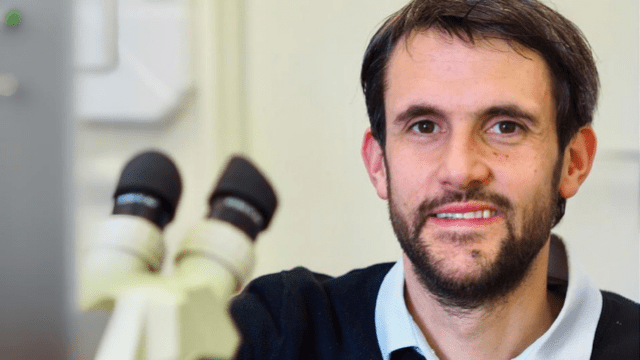Gwenolé JACOPIN, CNRS bronze medalist 2024
Gwénolé JACOPIN, former student of the DER Nikola Tesla (Electronics-Electrical Engineering and Automation), class of 2005, received the CNRS bronze medal in 2024.
He is a CNRS researcher at the Néel Institute, a CNRS laboratory in Grenoble specializing in fundamental research in condensed matter physics, and a member of the SC2G research team. His work focuses on the optical and electrical properties of wide-bandgap semiconductor materials at the nanoscale.
He received the CNRS bronze medal in 2024. Congratulations!
Portrait
Could you please retrace your journey at ENS-Paris-Saclay?
I joined ENS Cachan (the former name of ENS Paris-Saclay) in September 2005, in the Electronics-Electrical Engineering and Automation (EEA) department. I obtained a Licence 3 and a Master 1 in partnership with the University of Paris-Sud. In parallel, I completed a magistère in EEA. I spent the second semester of my Master 1 at Polytechnique Montreal. In my third year, I pursued the physics agrégation with a specialization in applied physics, and I was ranked 2nd. Finally, I obtained a Master 2 Research in "Material Sciences and Nano-Objects" from the University of Paris VI Pierre and Marie Curie. Following my studies at ENS Cachan, I received a specific research grant for normaliens, which allowed me to pursue a PhD at the University of Paris 11 Paris-Saclay.
What have been the key stages of your career?
After my four years at ENS Cachan, I pursued a PhD at the University of Paris 11, where I began studying nanowire-based light-emitting diodes. This confirmed my interest in research in general and optoelectronics in particular. I then decided to continue my career abroad. I spent over six years at the Swiss Federal Institute of Technology in Lausanne (EPFL), first as a post-doctoral researcher and then as a junior project leader. During this period, I developed innovative methods to characterize the efficiency of optoelectronic devices at the nanoscale. Since 2018, I have been a CNRS researcher at the Néel Institute in Grenoble. I continue to develop nanoscale optoelectronic characterization techniques to improve the efficiency of light emitters ranging from red to ultraviolet.
What are your current research focuses?
Today, my research pursues two objectives:
- Developing ultraviolet light-emitting diodes (LEDs). This spectral band is very important because it can "break" DNA strands and is therefore very useful for surface disinfection or water purification. Our originality lies in using nanowires to create these LEDs, in collaboration with CNRS and CEA colleagues in Grenoble.
- Developing beta-voltaic batteries based on diamond. I collaborate with the Grenoble startup Diamfab on this. These batteries operate on a principle similar to photovoltaic cells but draw their energy not from sunlight but from the radioactive decay of nuclear waste. This allows them to have lifespans of several decades.
You have just received the CNRS bronze medal. What does such scientific recognition bring? What are your projects?
This medal recognizes the original approach of my research, which aims to understand the operation of optoelectronic devices at the nanoscale to propose innovative solutions to improve their efficiency. I see this medal as an encouragement to continue my research following this philosophy: understand to improve.
What has your training brought you that has been of great use in your career? A memory of your time at ENS-Paris-Saclay or advice for current and future students of the Nikola Tesla department?
Undeniably, the broad spectrum of the training I received in the EEA department at ENS Cachan is very useful in my current research. This initial training allows me to communicate with both condensed matter physicists and electronics researchers. Moreover, it enables me to link the fundamental properties of matter with the performance of devices, which is the core of my research.
Among the four years I spent at ENS, my best memories are the numerous lab sessions and the various projects we had the chance to carry out. These works in pairs or trios gave me a taste for experimental science and teamwork.

Comments0
Please log in to see or add a comment
Suggested Articles


